Making Plans for Stefan: Black Mirror: Bandersnatch and Interactive Narratives
By gamer_152 0 Comments
Note: The following article contains major spoilers for the Black Mirror game Bandersnatch, some spoilers for other Black Mirror episodes, some discussion of mental illness, and brief mentions of domestic violence.
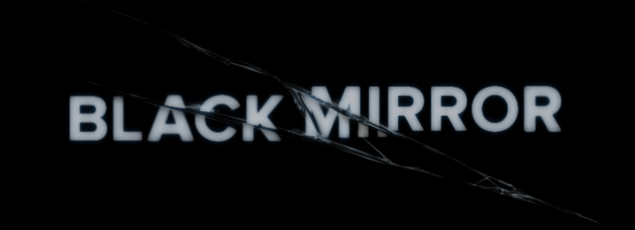
Too much of the criticism of Black Mirror's Bandersnatch has been from people who appear somewhat perplexed by the whole experiment, and I think those reactions have arisen from many critics and audience members who have their expertise in TV now straining to assess a video game. You have commentators acting like Black Mirror just invented the concept of forking interactive fiction even when this story is about the adaptation of a choose-your-own-adventure book from the 80s. You have people explaining why branching narratives can never be affecting when Telltale proved the opposite back in 2012, and you have armchair pundits speaking about Bandersnatch as if it's the first piece of media to comment on choice-driven stories when the original Stanley Parable released in 2011.
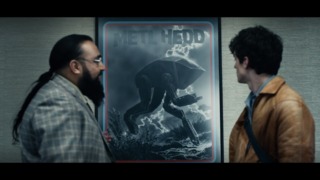
We must appreciate that Bandersnatch is many peoples' first time shaking hands with a piece of media that asks them to map out the channels and tributaries of a plot in motion. Frankly, it's something to celebrate. The most influential legacy of the game will probably be that it was a branching narrative title situated on a mainstream media platform. It's comparable to a work of modern art in a town square; it's not likely to be the piece that's going to demolish the boundaries of the medium, but it does let the average person get in touch with the art form. That being said, it is frustrating to see those people in that public square jumping to conclusions about the whole medium based on an example or two, or arrogantly trying to deliver some final word on the form before reading the first word. This isn't me saying that I have all the answers on interactive fiction, but it is me saying that before people speak on the pivots and twists of story-centric video games, they should read what other hard-working critics have written about them over the years.
Of course, some would argue that Black Mirror, as a show, has nothing of worth to offer anyone, but there are thoughtful criticisms of the series' unfiltered techno-cynicism, and then there are reductions of it to a braindead "Phones make people into zombies" rhetoric. Whatever you want to say about Black Mirror, its points are more specific and varied than that. Every episode has a moral, and it's rare that it repeats the same moral twice. Fifteen Million Merits opines that in a world of commodities, even rebellion against that economic order will be commoditised; White Bear suggests that even if a criminal has committed a revolting transgression, that torture of them is still immoral; and Men Against Fire speculates that the future of military technology is in psychologically controlling our troops as much as it is working out how to kill the enemy. In fact, I don't think Bandersnatch's problem is that its commentary is vapid or uninspired; it's the opposite: That there's a lot of different observations pinging off the walls of the game, but very few of them combine to make an overall "point".
The Text
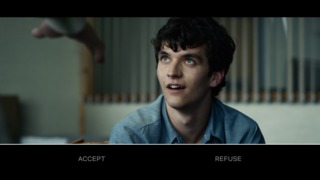
Like an idiot, I will now attempt to summarise a branching plot game with at least fourteen endings. If you feel you have a thorough understanding of Bandersnatch, scroll down to the "Subtext" section. Bandersnatch centres on Stefan Butler, a reclusive but keen young man who wants to adapt the choose-your-own-adventure book Bandersnatch into a video game, the likes of which has never been seen before. We can choose whether he does this at home or at the flourishing game studio Tuckersoft, working alongside his hero Colin Ritman. If Stefan does buckle down at Tuckersoft, he finishes the game promptly, but his vision dwarfs what the technology of the era is capable of, and his game fails to achieve critical success. But, as with all endings in this game, the player can rewind from it to make different choices. The characters seem to covertly acknowledge this mechanic, with Colin telling Stefan "wrong choice" when he decides to work for Tuckersoft, our protagonist being able to predict events early in the game if the player loops over, and a TV reviewer saying that Stefan "has to try again" if his game fails to impress.
If we go back and make Stefan program the game at home, he becomes isolated, his development hitches, and he enters a state of mental deterioration. He visits his therapist, Dr. Haynes, to whom he explains that the impulse to say "No" to Tuckersoft came out of nowhere and that he feels like someone is watching him. We can also decide whether Stefan discusses his mother with Haynes. If he does, we learn that one day when Stefan was a toddler, his father hid his beloved plush rabbit, believing it was too childish for him. The next day, Stefan was due to take a train journey with his mother but held her up by looking for the rabbit. She ended up taking a later train and taking it without Stefan; it derailed, killing her, a tragedy for which Stefan now feels responsible. Haynes tells him that his guilt is irrational and that the past is immutable; it's something we have to accept.
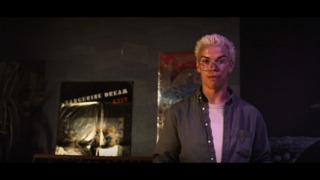
Stefan works at home for a while longer but becomes frustrated as Bandersnatch glitches and fractures. At this fork, we may have him throw coffee over his computer, spoiling his work and ending the game, or we may have him yell at his father, causing his Dad to take Stefan back to Haynes. Outside her office, Stefan spies Colin walking down the street, and we can have our protagonist run after him or carry on to his doctor. If Stefan follows Colin, then he tells him about the development hole he's fallen into, and Colin takes him back to his flat. His mentor doses him with LSD and uncorks a conspiratorial rant.
That rant includes the opinion that mirrors let you travel through time, and that the fabric of the universe, or at least, his and Stefan's universe, is a network of parallel timelines. There is, according to him, a source code for reality which determines what choices are available to people. In his paranoid fervour, Colin takes Stefan out onto the balcony and asks him which one of the two of them should jump. Obviously, us having Stefan jump will terminate the story and cause Tuckersoft to publish Bandersnatch in its unfinished state. Should we pick Colin to jump, Stefan wakes up in his Dad's car again, right outside his therapist's office. He tells the doctor that time is looping over and that someone else is making his choices for him. Haynes ups his medication, and if the player has avoided listening to Colin's lecture, Stefan can take the pills, leading him to publish an even worse version of Bandersnatch than if he'd created it in-studio. The critic says it looks as though he made it on autopilot. If Stefan did listen to Colin's ramblings, our only choice is how he destroys his pills. Off his medication, Stefan fails to deliver his code to the studio by his deadline because he attempts to add in a quest based around government black ops.

He then continues researching Jerome F. Davies, the author of Bandersnatch, finding that Davies' mind came apart at the seams as he tried to finish his book and that he developed the same beliefs about free will that Colin later did. Davies believed that his wife was spiking his drinks with a psychotropic drug and killed her, painting the walls of their home with a glyph of branching lines. As Stefan becomes paranoid about the TV relaying Jerome's beliefs and sees his game locking up again, we may choose for him to look at an old photo of his family together or to read a book on adventure game design called "Look Door, Get Key". The former skips the plot ahead, while the latter leads to him breaking into his Dad's safe, following the command in the textbook's title. What happens in the safe scene depends on what code we put into the vault's keypad.
One path involves Stefan taking his childhood plush from the office, going back in time, and placing it under his bed so that he will find as a child. His mother then asks him whether he will go on the train journey with her, and if we pick "Yes", Stefan also dies in the train accident. It's effectively a suicide by temporal displacement. We then cut to Haynes' office where it's revealed that everything we've seen since Stefan last left was in his head and that he has died in real-life after expiring in the flashback. Another of the paths involves Stefan discovering that he is a subject of a psychological experiment on trauma conducted by his ostensible father called P.A.C.S. Other endings to the safe scene include Davies or the fictional demon Pax attacking Stefan. At the end of the P.A.C.S., Davies, and Pax endings, Stefan wakes up.
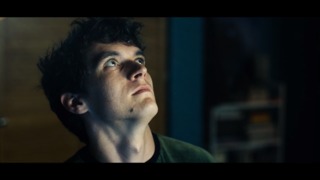
After another failure to get the title screen of Bandersnatch to load, the interface asks us how we want Stefan to destroy his computer, but whatever we pick, he manages to resist the impulse to do so. Believing someone is watching him, our protagonist asks us to give him a sign that we're there.
Netflix Branch
If we didn't encounter the P.A.C.S. documents, then we may tell Stefan that he is a character in a piece of interactive fiction on Netflix. Stefan returns to Haynes to relay this and Haynes rationalises that if he was a puppet created for other peoples' entertainment, then he would be in more exciting circumstances. The scene forces us to raise the excitement level by having the encounter turn into a kung-fu fight scene between Stefan and Haynes. If we have Stefan fight her, his father drags him out of the facility as he yells, implying that he hit a harmless Haynes in a fit of delusion. If we have him try to jump out the window, he finds it glued shut, and the camera pulls back to show that he is an actor in a TV show who falsely believes he is the character himself.
P.A.C.S. Branch

If the player did encounter the P.A.C.S documents, then they may inform Stefan about the experiment. Stefan accuses his father of drugging him, recording him, and hiding messages on his computer. He then kills him and in a shaken state tries to call Haynes. One of the branches here leads Stefan to believe that Haynes was secretly communicating her phone number to him, but even if Stefan calls her, her receptionist tells him that the doctor is absent. Either way, he buries his father in the garden, next door's dog finds the body, and he goes to jail. From his cell, he watches a review of Bandersnatch which the critic regards as a malfunctioning novelty.
Glyph Branch
Whether or not Stefan discovered the P.A.C.S. documents, we may have his computer display Davies' branching glyph, prompting him to attack his father in the same way Davies butchered his wife. The game asks us to choose whether Stefan goes through with it or backs off, but attempting to stop him from killing his father only causes the UI to prompt us with the same choice again. Stefan then queries us over whether he should bury his father's body or chop it into pieces. If Stefan does the latter, he enters a creepily serene state in which he finishes Bandersnatch in a perfect condition and explains that he fixed the game by eradicating player choice. The authorities pulp Bandersnatch after they find out his dark secret, but in the modern day, the developer Pearl Ritman revives it as the Netflix game we're playing. The ending implies that some curse of the game brings her under the player's control.
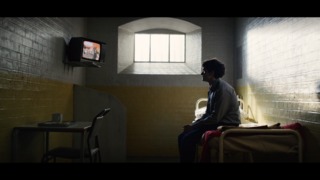
If we tell Stefan to bury his father's body instead of dicing it, his boss at Tuckersoft, Mohan Thakur calls him up and asks him whether he will have the game finished by his new deadline. The branches of the game fan out here, but they all lead to someone finding out about Stefan killing his father. In many of the endings, Stefan also murders Thakur, Colin, or Colin's wife Kitty when they come to his house to investigate. He gets arrested, and Tuckersoft cancels Bandersnatch.
The Subtext
We have a natural prejudice to believe that because Bandersnatch writer Charlie Brooker made his name as a TV writer and critic, that any interactive narrative he'd design would have a claustrophobic possibility space and only a passing awareness of video games. Brooker bucks those expectations, creating an authentic story with a vast network of branches. Some angry commenters argue that all the endings are the same, but read back through that plot summary and tell me Bandersnatch doesn't have several unique termination points. Stefan publishing his game under Tuckersoft, him dying on the train with his Mum, him realising he's an actor in a TV show, him fighting his therapist believing he's an avatar on Netflix, him killing his Dad thinking he's part of P.A.C.S., etc. These are, in each case, original plot points.
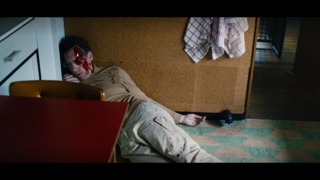
Some endings do touch up narrative columns you may have seen before with smaller brushstrokes, but the argument that Brooker wrote a single conclusion for the events of the story holds no water. Despite coming from creators of TV shows, Bandersnatch's story is more divergent than that of many video games, but this is part of why the experience is inconsistent. That inconsistency exists not just in its plot but also its morals, and the two are inseparable. When a piece of media expresses an underlying message, it's almost always communicated through how the characters interact with each other and the world around them. For example, in The Boy Who Cried Wolf, the message that we shouldn't raise false alarms is expressed through the protagonist repeatedly doing that and the negative consequence for his actions. Remove those actions or remove the punishment he receives and you remove the moral. If the townsfolk did help him when the real wolf arrived, the moral of the story would change to being that you can trick people into thinking there's danger as much as you like, and there will be no reprisals. Or, say the boy managed to scare off the wolf by himself; it's now a parable about how he never needed the help of other people to defend the sheep anyway.
In most interactive narratives, we can choose the actions of our character, but the reality they inhabit is concrete. Characters beyond the protagonist may act to change the course of the plot, but past events, other characters' actions, and the rules of the world are not open for the player to debate. An atypical aspect of Bandersnatch is that our choices can mould Stefan's reality. This is not necessarily because we have the power to shape his world's history and boundaries, but we do have the capability to reconfigure Stefan's perception of them.

When he approaches his father's safe, depending on the options we receive, we can choose whether the whole story since he left Haynes was in his head, or whether he progressed. Or we might be able to pick whether he's attacked in a dream by a demon or a developer. When he enters a paranoid fit and asks "Who's there?", we can decide whether he believes he's in a show on a streaming service, an experiment in childhood trauma, or branching realities where his destiny is to murder. Again, the options are dependent on which switches in the story we've flicked before that scene, but Stefan's window to reality is as volatile as his computer program. You'll notice that during his LSD trip, he presses his stares at the cover of Philip K. Dick's novel Ubik, another story which questions the existence of a singular or reliable reality. But when we can remix the world at a moment's notice, the concepts of stakes, set-up, and payoff start to melt away.
This remodelling of the story also leads to thematic changes similar to those we saw in our Boy Who Cried Wolf example. Bandersnatch starts as self-aware stroll through the simulated development of an 80s adventure game, but once we've discovered that we can reset time and we hear Haynes tell Stefan that he can't change the past, the narrative is reframed as an exploration of what we might do if we could go back in time to erase our mistakes. Then, if we hear Colin's paranoid conspiracy theories, Bandersnatch appears to confront us as an expression of the horrors of determinism or a description of multiverse theory through the medium of choice-based adventure. In the second session with Haynes, it appears that Brooker is talking to the way that player agency may invalidate character agency. He also draws our attention to the necessity of the fourth wall. Main characters in games are frequently empowered and actualised through the agency the player lends them, but if they knew that they were just a peripheral for the player to act through, their sense of self and agency would be radically diminished, as it is for Stefan.

While Stefan would seem to be doomed to this ludic slavery, we can have him take the higher dosage of pills that Haynes has given him, and it works to cure him. The fact that he stopped believing the user was controlling him after taking anti-psychotics and that the game ends there strongly suggests that the player control was all in his head, and if there was no diegetic player manipulation, then this can't be a story about it. Any of the effects and consequences we would have previously attributed to player agency or the multiverse, we must now attribute to Stefan's illness. Him dying on the train is complicated enough that I'm not going to touch the subtext of it, but feel free to fill in your interpretations on your worksheets.
If we get down to the hand-to-combat with Stefan's therapist, then there's some commentary in there about the emptiness and inconsistency inherent in media giving into audiences' most immediate impulses. Although, the ending in which Stefan is dragged out of her office suggests that the plot events reinforcing that idea didn't happen, meaning that we have to discard ideas about Netflix and alternate realities. The path on which Stefan kills his father for making him the subject of P.A.C.S. also hints at him being detached from reality; his father genuinely doesn't seem to understand what Stefan is talking about when he brings up the study, and the boy barely gives him a chance to respond before killing him. The endings in which we show Stefan the branching path symbol, and he imitates Davies' crimes, suggest a danger in idolising toxic heroes and depict the most extreme adverse effects that media can have on us. The endgame of this path is engraved with a straightforward "murderers never prosper" motto.
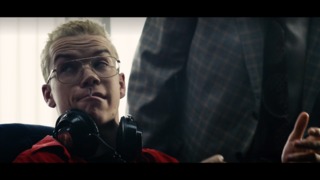
There's a lot of prose out there which achieves depth by exploring many different concepts at once, but that's not what Bandersnatch is doing. Instead, what we see here is a narrative in which the driving ideas are ephemeral and discardable. As the themes and point of the story can change every ten minutes, that story appears to us like chunks of a lot of different scripts glued together instead of one continuous script. It's, to some degree, intentional, as the game has us hopping across Colin's multiversal branches, but at a point, you feel like Bandersnatch should decide whether it wants to explore topics or just disorient because it can't do both at the same time.
There's a lot of hasty online invective right now talking about how Bandersnatch is irrefutable proof that player choice ruins narrative, but there are games similar to this one that have managed to handle the pressure of player input with more poise. The Stanley Parable shows a better delivery vector for the kind of messaging that Bandersnatch is trying to put across, even if the two games' philosophical commentary only partially overlaps. The Stanley Parable has many branches with many lessons to teach, but it more or less ensures that once you've committed to one branch, the remaining narrative will be dedicated to a single idea. It's also rare to catch that game making a point that it then goes back on or trying to fuse so many comments into one of its branches that neither the player nor the writer can examine them at length.
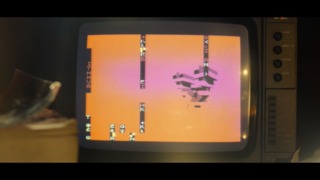
However, the narrative flowchart that makes up Bandersnatch is generally more complicated than that of The Stanley Parable. Plus, it has a lot of side sections full of commentary that then slot back into the main path, and there are interpretations of the story which tell you that even when you reset from a side path, the events from it still happened; this is what Colin and Stefan believe. All these plot lines with contradicting concepts about the characters and universe feed into each other, and they begin to invalidate each other, reducing the plot to a confusing, unfocused sludge.
You can conceive of a player having a relatively short session of Bandersnatch which produces a non-contradictory narrative with clear messaging. However, most players are going to take a winding path through the story with detours which give them a whole lot more context and subtext that they're going to apply to everything past then. Bandersnatch's problem, far from lacking divergence, is that its B-roads and cul de sacs are so divergent that they resist merging into a singular work. The kung-fu ending is correct that bowing to whatever spontaneous whims the player may have for the story at any one time leads to a jarring and nonsensical narrative, but in this narrative, the changing of commentary and world rules happens just as spontaneously to suit the writer's whims.
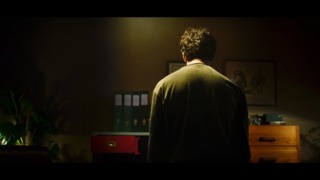
Now, just because the game can't commit to all of the ideas it entertains, that doesn't mean that it can't commit to some of them. Remember those players complaining that the endings were too homogenous? The playthroughs they describe have something in common. Some players just haven't explored the timeline that methodically, but others kept banging away at menu options until they crash-landed at the bottom of the Glyph Branch and just kept running into the same few flavours of "You killed your Dad, you are arrested for murder" until they got bored. When we analyse an interactive medium, we have to look at not just the events that unfold out of our control, as we would with non-interactive media; we also have to break down what kinds of interactions the work invites.
There is one concept that I described earlier that the game does hold tight to from beginning to end. The development of the in-game Bandersnatch might seem like nothing more than a yardarm from which to hang Stefan's loss of control and psychological breakdown, but the game goes to great lengths to show how the conditions he develops the title under affect the product. In fact, almost all endings tell us the state of Bandersnatch at the close of the story, complete with a review score, and sometimes it turns out better than others, inviting us to use it as a measuring stick by which to gauge how "good" our ending was. We're not forced to do that; we can also decide that our character's health and wellbeing matter more. However, it's common for players to look for quantitative metrics of success, and to seek out perfection; to ask "What if I just did it a little differently next time?". Bandersnatch's audience is explicitly encouraged to think this way by Colin and Stefan's nudges to circle back around to the front of the ride on the first failure or two. Of course, if you go as far as killing your father in trying to develop that game, you probably now feel like you're in too deep to back out and must frantically find some mythical means to get away with murder.
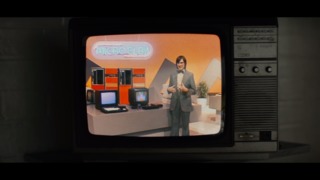
There's nothing atypical about the end state of his game if you choose to work at Tuckersoft. Its designer has this highly ambitious vision that needs to be ruthlessly scaled back because of the realities of development. He wants as many branching paths in his game as this doorstop of a choose-your-own-adventure book has, but Thakur explains why it's not possible: He only has 48 KB of memory to work in. The ending in which Stefan receives a 5/5 review for the game seems implausible and possibly part of a delusional post-murder fantasy because there's no way you would have fit a whole Middle Earth on a ROM cart in 1984. If he works in-house at Tuckersoft, he can put out a disappointing, pint-sized adaptation of Bandersnatch, but most peoples' first games aren't going to set the world on fire. We, like he, are likely to decide that we're not content with this, and so we have him develop the title at home, away from the support of Tuckersoft, which turns out to be a much worse idea.
Working from home can be isolating, and newer developers may underestimate the degree of support that they can get from being in proximity to a team of creators and having a publisher close at hand. Stefan is living in a pre-internet era, so when he locks himself in his bedroom, he is completely alone. Cut off from industry support and human contact, he drives himself mad trying to produce a game that can even boot. For whatever damage it may do to a consistent sense of character, plot, and theming, this is where the looping narrative comes into its own. After seeing scenes so many times over and watching the story be framed in so many different contexts, the sense of an order of events or a concrete reality vanishes, and this effect is only as potent as it is because of the interactivity of Bandersnatch.
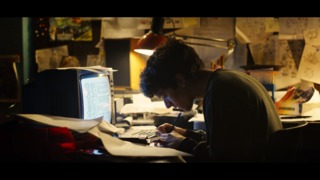
Now, we as players are entering Stefan's mindset of dissociation. Dissociation is a psychological response to trauma and stress; the mind disconnects from reality as the emotional pressure of it pushes the sufferer to breaking point. It should come as no great shock that Stefan is at risk from this symptom; the game starts as he is approaching the traumatic anniversary of his mother's death, and if we have him develop Bandersnatch at home, then his job and the working conditions we've chosen for him are going to cause him to boil over with anxiety. The game also finds a way to implant the same delusions in us that it has in Stefan. You wouldn't have much luck convincing most mentally healthy people that an unseen gamer controls their decisions or that mirrors enable you to go back in time, but we are willing to entertain this breed of ideas in fiction. So it's easy for us to believe, like Stefan, that he is part of a predetermined reality where an invisible audience is monitoring and controlling his thoughts and actions.
Note that severe and bizarre delusions often involve the subject believing they have access to some privileged stream of information. Truths about the universe have been revealed to them by aliens or the voice of god or messages from the television. There's a reason that no one else can "know" what they "know". We also think we have privileged streams of information playing Bandersnatch through the previous timelines and self-aware references the game makes. We're taught to look for self-referential content early on as the game proudly gestures towards previous Black Mirror episodes like Metalhead and Nosedive. Like someone plagued by delusions, we begin to believe we're receiving secret messages from Colin or Jerome Davies and we twist tidbits of conversation to fit our model of the world. When our colleague said "wrong choice", he didn't mean that we were making a bad professional decision, he was telling us to go back in time and take the other branch of the time stream. When we learn about the demon Pax, that's not a character in a book, that's referring to the psychological study that our Dad has been conducting on us since birth. And only we can know these things because we can see the world from an outside perspective and loop our choices over. Of course, if you believed these things or said them to anyone in the real world, you'd be paranoid and quite possibly sick; you'd be like Stefan.

In Stefan's mind, he needs to be able to turn back time. He blames himself for his mother's death, and he wants to be able to change the past. A cosmic monkey paw grants his wish only for him to find, like many fictional time travellers, that even if he could change the past, the complex overlapping factors of his history mean that he'd likely make things worse. He's certainly not going to get anything productive done in his highly agitated state. Of course, we, like the protagonist, are given multiple chances to put a stop to the unravelling of his mind. We get two chances to destroy his computer, we can choose to visit the therapist and have him take his pills, or we can just stop playing, but we, like Stefan, may become fixated on changing the past and perfecting Bandersnatch, or eventually, just getting out of trouble. Even when the tools at our disposal are shown to be ruinous and toxic, we can't walk away. This protagonist's sickness and isolation fuel his obsession with the game and his conspiracy theories, and as he focuses more on the game and those delusions, his sickness and isolation only inflame further. The only "good" choice is to break the cycle. Else, you become like those people who are convinced the endings are all the same because they followed the flowchart all the way down to the bottom and trapped themselves in an endless loop of murdering their Dad and being arrested for it. What these players perceived as the inevitable product of the narrative was a product of their iterative, perfectionist approach to the game.
Bandersnatch is, on the whole, emotion over thought, and that means it's not as deep as some Black Mirror episodes, but it does make it an unparalleled simulation of delusion and disassociation. It's also surprisingly brave for a game introducing the concept of branching narratives to many members of the public for the first time to not simply reward their interaction with those branches. This game could have been a proof-of-concept; a program that showed the potential balance of agency and cohesion possible in interactive narratives and that showcased them as a platform for empowerment fantasies. It's in classic Black Mirror fashion that Bandersnatch does the opposite. It is a game where the obsession with control and choice is shown to be a blight on your life and where some fantasies are shown to be nothing more than self-destructive illness. Thanks for reading.